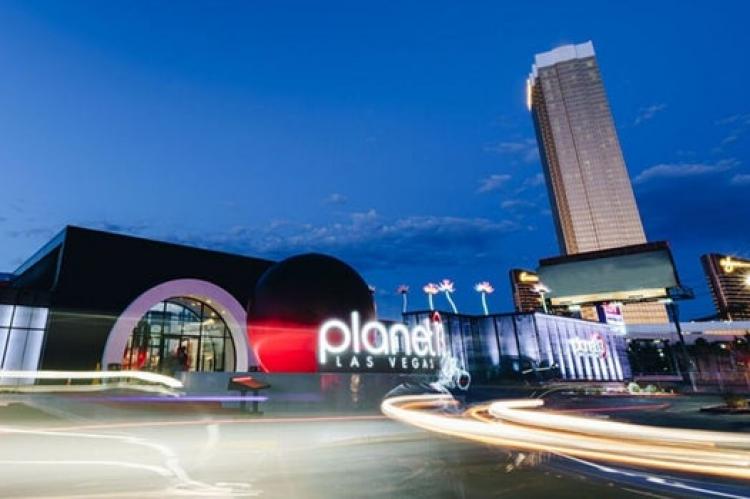Brick & Order - The Pandemic Transforms Cannabis Shops Into E-Commerce Hubs
One cannabis storefront's executives reported that, at $100,000 a day, sales were only half of what they had been before the lockdown.
The gigantic Planet 13 dispensary in Las Vegas was conceived as a tourist destination as much as a store.
It calls its 112,000-square-foot facility a “Cannabis Entertainment Complex,” offering “an unparalleled customer experience focused on unique interactive entertainment.” These include laser-light displays, electronic lotus flowers controlled by customers and an “aerial orb show.” And — oh, yeah — you can buy weed there, too. The web site also telegraphs Planet 13’s ambition “to operate ultra-high-end dispensaries in tier-one markets nationwide.”
Plans like that are on hold industry-wide. Of course, Planet 13 was conceived well before the COVID-19 pandemic struck. Once it did, the company had to quickly shift resources from its “showroom” and toward the more mundane tasks of delivering weed or distributing it curbside.
In March, Nevada authorities ordered dispensaries to close their shops to the public and offer delivery only. Planet 13 hurriedly increased its delivery fleet from five cars to a 30.
Dispensaries could open their doors again in May, but that didn’t do much to bring customers back. In a conference call with investors last month, Planet 13 executives reported that, at $100,000 a day, sales were only half of what they had been before the lockdown. It marked a huge improvement over the $10,000 the store was generating daily in March, but with the pandemic now worsening again, things won’t get back to “normal” for a long time yet.
And even then, “normal” will look very different from before. Among other things, there will be much more emphasis on Internet purchases, deliveries, and curbside pickup than anyone had envisioned before the crisis.
Re-tooling
For dispensaries, delivery is not just a matter of buying cars and hiring drivers. Operating a showy storefront is very different from an e-commerce warehouse. Many dispensaries, including Planet 13, offered online sales and delivery before COVID.
But since the pandemic hit, swaths of the industry had to convert to being primarily e-commerce operations “almost overnight” said Socrates Rosenfeld, CEO of the Santa Cruz, Calif.-based I Heart Jane, which makes software for cannabis retailers. “E-commerce is now the preferred method of doing business,” he said.
It’s too early to know how plans for capital outlays have changed, but many dispensary operators are at least talking about shifting resources away from bricks and mortar and toward their online stores. To do so, they’ve had to create or scale up their logistical systems both on the front end (delivery and pickup services) and on the backend (software to manage online sales).
Unlike mainstream businesses, cannabis retailers must fend for themselves. “There is no Postmates in this industry” Rosenfeld said. Nor is there a GrubHub or an Uber Eats. The systems have to be developed and scaled in-house, as Planet 13 has done. That’s no easy task. “It’s very, very complex on the backend,” Rosenfeld said.
It’s also a necessary investment that could ultimately pay off in a big way. Online sales aren’t merely convenient for consumers, they enable merchants to do things they wouldn’t otherwise be able to do. For example, they allow sellers to price products dynamically; that is, allow prices to change, often automatically, depending on factors such as demand level, the time of day, and inventory.
Permanent Change
In many cases, dispensary owners have little choice. Once people get used to buying online, they prefer to keep doing it. “We’ve already seen it,” Rosenfeld said. “People don’t want to go back to the store.”
That doesn’t mean storefronts will go away. High-end pot shops like Planet 13 and The Apothecarium in San Francisco are often compared to Apple Stores because of their high-polished appearance. Now they might start operating more like Apple Stores: places people go to check out products or get help, while still doing most of their actual buying online.
While demand for budtenders might fall, the job won’t disappear entirely. “Technology will never completely replace human-to-human interaction,” Rosenfeld said. Especially for high-end shoppers, storefronts will continue to be a major draw.
Rosenfeld envisions such shops offering “in-store consultations,” where customers reserve time with a budtender. After they learn which products they like best, they can order them online until the next time they need guidance. This is happening in some shops already, but trends point to it becoming more common.
The level of the challenge depends on many factors, including store size and location. In some more remote areas, the pandemic hasn’t hurt business much, and therefore no massive retooling is necessary. Even in California’s Emerald Triangle, where cannabis retailers are more dependent than most on tourism, business hasn’t slowed much.
“We’re still booming,” said Tony Rocha, manager of MendoCann, in Hopland. Even some tourists are coming back, he said, and the shop also enjoys a loyal local clientele. “ A lot of people like shopping face to face, he said. “They can go online, but they can’t see what they’re getting as well as they can in the store.”
- Log in to post comments

